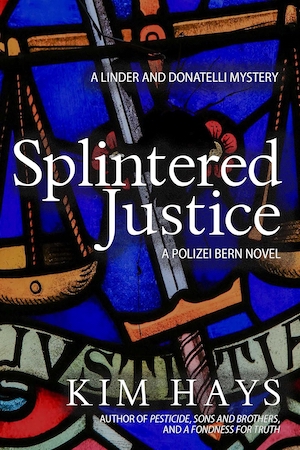
Kim Hays returns with Splintered Justice, the fourth book in her Polizei Bern series and we get to return to the seemingly serene yet sometimes shadowy Swiss city. In this latest instalment, detectives Giuliana Linder and Renzo Donatelli take on two cases that force them to expose long-held secrets, navigate the complexities of justice and confront their own evolving relationship.
Splintered Justice opens with an incident at Berner Münster, the city’s imposing Gothic cathedral. A teenager violently shakes a scaffold, causing a glassworker, Denis Kellenberger, to fall and sustain serious injuries. Although Denis does not recognise his attacker, their outraged accusation – “Murderer, I hope you bust your head open!” – leads him to believe that the action is related to an event 15 years earlier.
When Renzo looks into the identity of the attacker and their motive, he begins peeling back the layers and going into Denis’s past. The stained glass specialist’s grandparents worked as tower guards at the cathedral and he grew up alongside them in its bell tower. For Denis and his friend Zora, the building was a playground, much to the chagrin of the sexton and one of the ladies working in the church shop. Despite their best efforts, neither was able to get rid of the family. That is, until a tragic incident occurred.
One night Katica Horvat, Zora’s mother, entered the cathedral through the tower door, climbed the staircase and fell to her death. The sexton blamed this on Denis, then aged 10, who was in charge of locking the cathedral doors. Denis’ grandparents lost their jobs, forcing the family to leave the cathedral.
Renzo Donatelli, detective at Bern’s Kantonspolizei, is drawn to the cold case when he discovers a link between Denis and Katica. The verdict on her death was suicide, but perhaps that was swayed by rumours that she was having an affair. He also discovers that the original investigation wasn’t very thorough as the detective who conducted it was an alcoholic. Finding the truth when a case has been buried for so long proves particularly challenging for Renzo.
Meanwhile, Giuliana Linder finds herself embroiled in a morally ambiguous case involving a potential mercy killing. This secondary story explores the complexities of end-of-life choices and the legal and ethical grey areas surrounding them in a country where assisted suicide has been legal for decades. The inclusion of this subplot touches on the ongoing debates and harassment faced by those who help others die.
If you’re familiar with the series you’ll recognise the ongoing dynamic between Giuliana and Renzo. Hays hints at their evolving partnership, which has been simmering since Renzo joined Giuliana’s team two years prior. Now that Renzo has separated from his wife, the tension between them grows and Giuliana begins to admit her attraction to Renzo. Nonetheless, neither acts on instinct, and their encounters are characterised by a mix of professional respect and playful banter. The inversion of the conventional older man, younger woman scenario is a refreshing change, as Giuliana is 12 years Renzo’s senior.
The setting of Bern’s Old City, with the imposing Münster as a central backdrop, is successfully rendered by Hays, who has lived in Switzerland for decades. The narrative effectively uses the historical and architectural details of the city to create atmosphere and a sense of place, in particular the cathedral. It also discusses the experiences of refugees from the former Yugoslavia, adding a layer of social relevancy as Zora and her family were Croatian Swiss.
While the intricate plot and compelling characters are strengths, the narrative can be slow due to unnecessary details. While descriptions add to the vivid atmosphere, it can also detract from the momentum of the investigation, for example the chronicling of the exact route Giuliana walks gives you a sense of the city, but it also slows down the story and drains the tension.
The subplot centring around the euthanasia debate also feels redundant and distracting, even though Hays makes a slight connection between the two cases. Subsequently, Giuliana’s less interesting investigation and her character are possibly more in the background here than in previous novels.
Building upon the foundations laid in the previous books, Hays continues to peel back Switzerland’s veneer of picturesque perfection, exposing the humanity and potential for darkness that lie beneath. Splintered Justice is another engaging addition to the popular Linder and Donatelli series. Fans of crime fiction that delves into European history, secrets and complex relationships, with a strong setting, will likely find themselves captivated.
Also see Hansjörg Schneider’s Peter Hunkeler series, the most recent of which is Hunkeler’s Secret.
Seventh Street Books
Print/Kindle
£7.65
CFL Rating: 3 Stars









